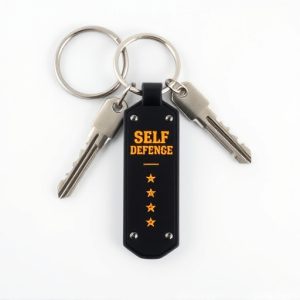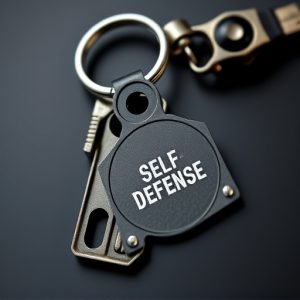Exploring Profitable Avenues in the Self-Defense Keychain Market
The self-defense keychain market is on an upward trajectory as consumers increasingly prioritize pe…….
The self-defense keychain market is on an upward trajectory as consumers increasingly prioritize personal security in a portable and discreet manner. Aspiring entrepreneurs looking to enter this field must perform thorough market research to understand consumer preferences, legal restrictions, and competition. It's crucial to analyze sales trends, buyer demographics, and prevalent self-defense keychain types to tailor offerings effectively. Entrepreneurs must also stay informed on the rise of personal security technology integration into keychains, such as alarms or defensive sprays, which is driving market growth. Legal compliance is non-negotiable, involving adherence to federal and state regulations that vary by region, particularly for products with defensive features like pepper spray or stun guns. A comprehensive understanding of the Consumer Product Safety Commission (CPSC) and the Bureau of Alcohol, Tobacco, Firearms and Explosives (ATF) guidelines is essential, along with staying updated on local ordinances that could affect product availability. Marketing must accurately represent products' functions and legal status to maintain consumer trust and avoid legal disputes. Innovation, quality assurance, and responsiveness to customer feedback are key for staying relevant in the market. A multi-channel sales strategy combining online presence with physical distribution, along with targeted marketing through social media influencers, educational content, and SEO, can help a self-defense keychain business successfully penetrate and thrive within this expanding niche.
Exploring the self-defense keychain market presents a unique business opportunity for entrepreneurs aiming to merge personal safety with everyday convenience. This article delves into the lucrative potential of this niche, guiding readers through market demand assessment, legal compliance, design effectiveness, and dynamic marketing strategies to effectively launch and grow a self-defense keychain business. Understanding the intricacies of sourcing, legalities, and effective sales channels is crucial for success in this domain.
Assessing the Market Demand for Self-Defense Keychain Products
The self-defense keychain market has seen a surge in demand as individuals seek convenient and discreet personal security solutions. Entrepreneurs looking to tap into this niche should conduct thorough market research to assess consumer preferences, legal restrictions, and potential competition. Understanding the demographic profile of likely customers is crucial; this includes analyzing data on self-defense product sales trends, demographics of those purchasing such items, and the types of keychain self-defense products that are currently popular.
Key factors to consider in assessing market demand include geographical location, as certain areas may have higher crime rates or specific safety concerns. Additionally, societal trends, such as increasing reports of violent crimes or personal safety advocacy, can influence consumer behavior and, consequently, the success of a self-defense keychain business. Furthermore, technological advancements in personal security devices can also drive market growth, with features like alarms, pepper spray, or stun guns integrated into compact keychain designs. By staying attuned to these dynamics, businesses can strategically position themselves to meet the growing need for effective and user-friendly self-defense keychain products.
Legal Considerations and Compliance for Self-Defense Keychains
When establishing a self-defense keychain business, it is imperative to navigate the complex legal landscape that governs the production and distribution of self-defense tools. Manufacturers must first familiarize themselves with federal and state laws as they vary across jurisdictions. Keychains that serve as self-defense mechanisms, such as those equipped with pepper spray or a stun gun, are subject to strict regulations regarding their sale, shipment, and use. Businesses must comply with the Consumer Product Safety Commission (CPSC) and the Bureau of Alcohol, Tobacco, Firearms and Explosives (ATF) guidelines to ensure product safety and legality.
Moreover, it is crucial to stay informed about local ordinances that may impose additional restrictions or prohibit certain types of self-defense keychains. Retailers must verify the legal status of their products in each market they serve, including online sales, to avoid inadvertent violations. Compliance includes not only adhering to laws but also obtaining necessary certifications and ensuring that marketing materials accurately reflect the keychain’s capabilities and legal use. A robust compliance program will protect the business from potential legal challenges while promoting customer trust and satisfaction within the self-defense keychain market. Entrepreneurs must prioritize these legal considerations to establish a sustainable and ethical self-defense keychain business opportunity.
Sourcing and Designing Effective Self-Defense Keychain Solutions
In the realm of personal security, self-defense keychains have emerged as a practical and portable solution for individuals seeking to enhance their safety. The self defense keychain business offers a unique opportunity for entrepreneurs to design and source innovative products that combine functionality with everyday utility. Sourcing components that are both durable and compliant with legal standards is paramount when creating these keychains. High-quality materials such as stainless steel, heavy-duty key rings, and non-lethal defense mechanisms like pepper spray or a personal alarm integrated into the design ensure the keychain’s effectiveness without compromising on its ease of use. The design process involves a careful balance between aesthetics, ergonomics, and safety features. It’s crucial to work with experienced designers and engineers who specialize in self-defense products to develop keychains that are not only stylish accessories but also reliable tools for personal protection.
The success of the self defense keychain business hinges on continuous innovation and responsiveness to market needs. Consumer feedback plays a vital role in refining product features, ensuring that each keychain meets the practical demands of its users. Additionally, staying abreast of emerging technologies and safety trends can lead to the development of new and improved self-defense keychain solutions. Effective marketing strategies that highlight the utility and design of these products can differentiate a business in this competitive market. By focusing on quality, convenience, and personal safety, businesses can carve out a niche in the self defense keychain industry, providing customers with peace of mind while navigating their daily lives.
Marketing Strategies and Sales Channels for Promoting Your Self-Defense Keychain Business
In the realm of personal safety, the self-defense keychain market has seen significant growth, with consumers increasingly seeking portable and discreet security solutions. Effective marketing strategies are pivotal in capturing this audience. Utilizing social media platforms like Instagram and Facebook, with targeted ads that reach demographics interested in self-defense, outdoor activities, or personal safety, can be highly effective. Collaborating with influencers who align with the brand’s ethos to demonstrate the keychains’ functionality can also amplify reach. Content marketing through blogs, tutorials, and safety tips can establish thought leadership and brand trust. Additionally, leveraging SEO strategies by incorporating relevant keywords, such as ‘self defense keychain business,’ ensures visibility on search engines for potential customers actively seeking these products.
For sales channels, a diverse approach often yields the best results. An e-commerce platform with a user-friendly website is essential for direct-to-consumer sales, allowing for a seamless shopping experience. Online marketplaces like Amazon and Etsy can also be valuable for reaching a broader audience. Beyond digital avenues, consider partnerships with local businesses such as martial arts studios, self-defense classes, and campus stores to offer your keychains where your target demographic shops and trains. Attending trade shows and industry events not only provides networking opportunities but also direct access to a captive audience interested in self-defense products. By implementing a mix of online and offline sales channels, coupled with strategic marketing initiatives, your self-defense keychain business can effectively reach and protect potential customers.

